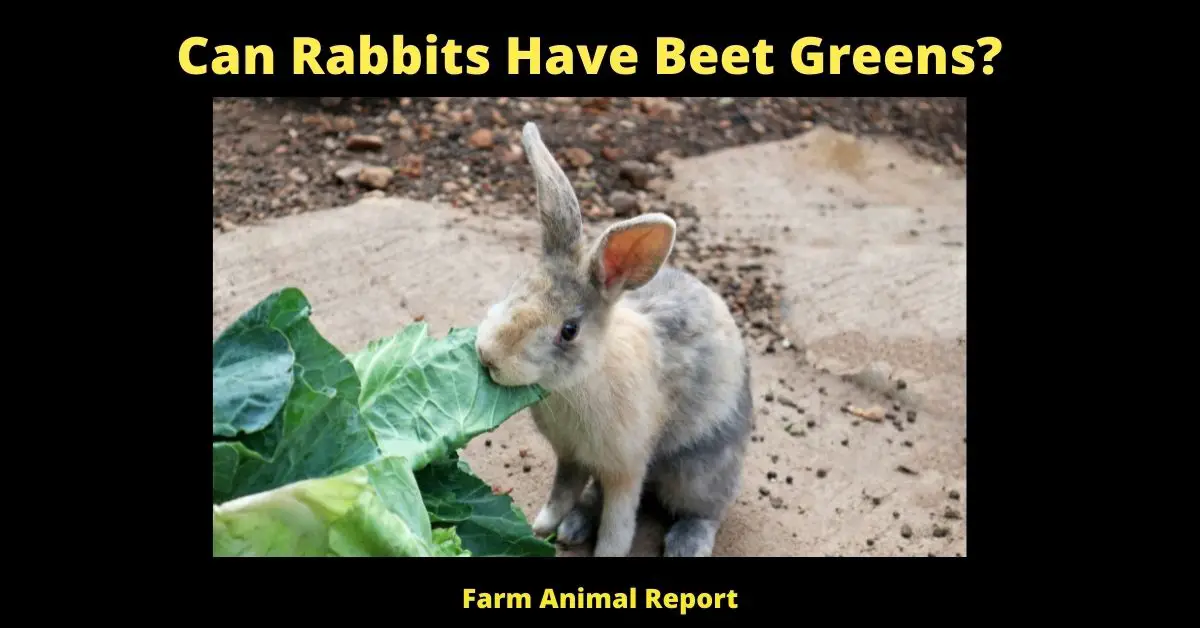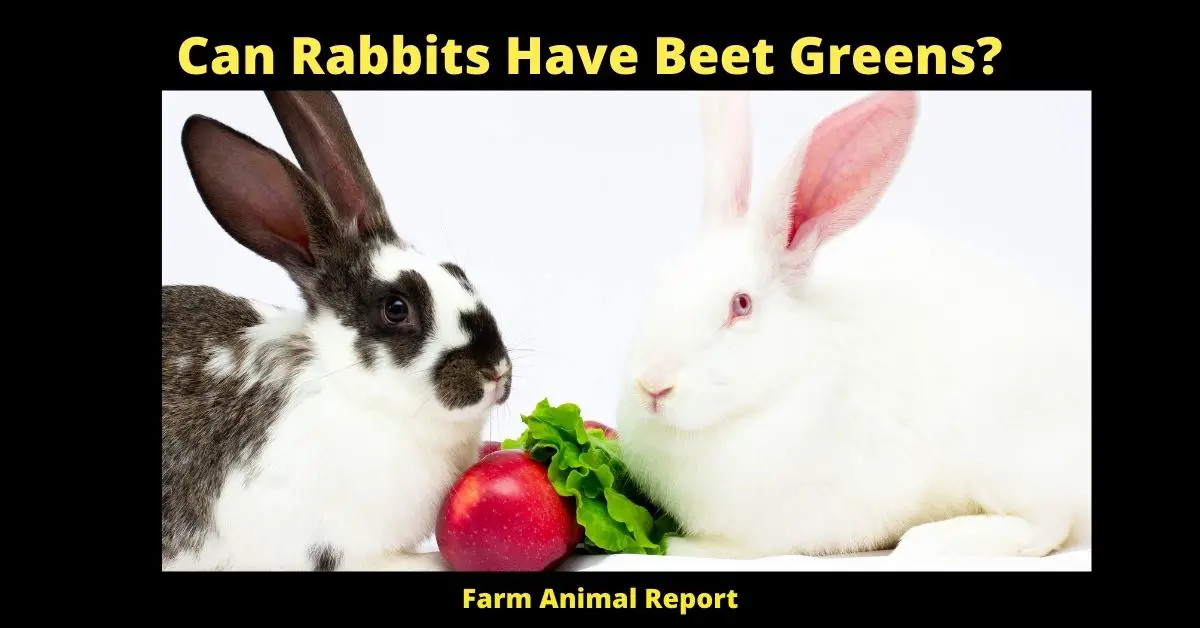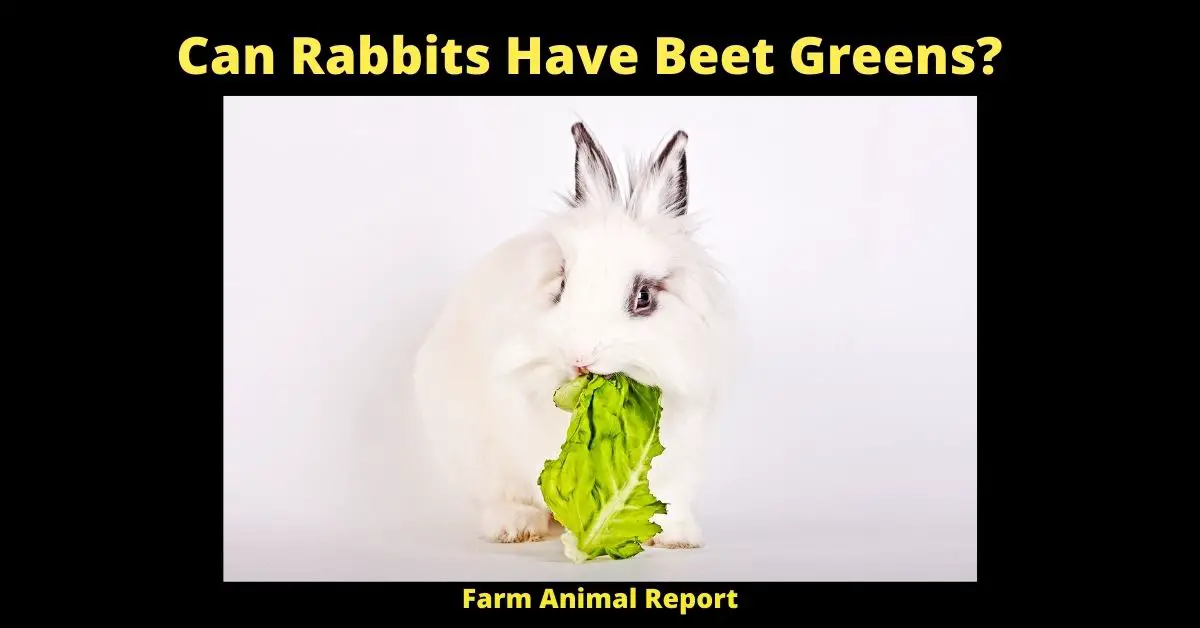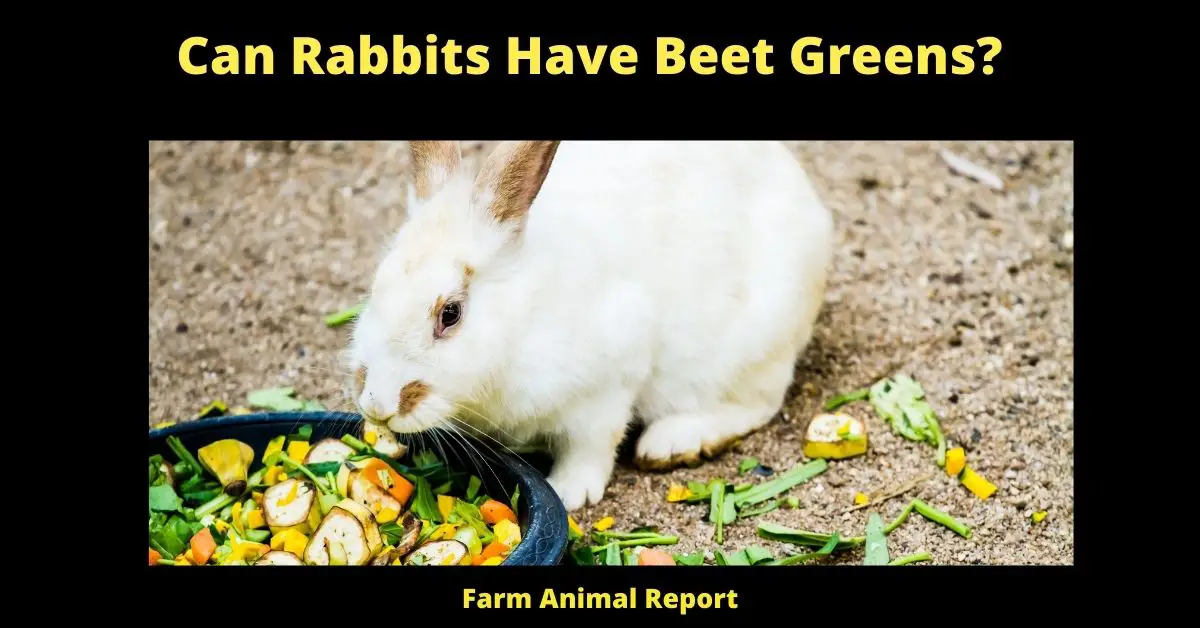Can Rabbits Eat Beet Leaves?
Can Rabbits Eat Beet Leaves – Rabbits are herbivores and they can eat a wide variety of vegetables. Beets are a healthy vegetable that rabbits can enjoy, but you should be careful with the beet greens. Beet greens contain high levels of oxalic acid, which can cause health problems for rabbits if they eat too much. In this blog post, we will discuss the nutritional value of beets and beet greens, and whether or not rabbits can eat them safely. Can Rabbits Eat Beet Greens?
What are Beet Greens?
Beet greens are the leafy greens that grow above the root of the beet plant. They are typically tender and have a slightly sweet flavor. Beet greens can be eaten cooked or raw, and are often used in salads or as a garnish.

In addition to their culinary uses, beet greens are also a good source of vitamins A, C, and K. They also contain important minerals like iron and manganese. Beet greens can be found year-round, but they are most plentiful in the spring. What are Beet Greens?
Check Out Amazon for Resources about Breeding Rabbits
When selecting beet greens, look for leaves that are brightly colored and free from wilt or brown spots. Store them in a bag in the refrigerator, and use them within a few days for the best flavor and nutrition.
What are the Nutrition Benefits of Beet Greens?
Nutrition Facts – USDA
total Fat 0 g0%
Saturated fat 0 g0%
Cholesterol 0 mg0%
Sodium 86 mg3%
Potassium 290 mg8%
Total Carbohydrate 1.6 g0%
Dietary fiber 1.4 g5%
Sugar 0.2 g
Protein 0.8 g1%
Vitamin C19%
Calcium4%
Iron5%
Vitamin D0%
Vitamin B60%
Cobalamin0%
Magnesium6%
What is Oxalic acid found in Beet Greens?
Oxalic acid is found in many fruits and vegetables, including beet greens. This organic compound acts as a natural preservative, and it can also help to give foods a tart flavor. While oxalic acid is safe to consume in small amounts, it can be harmful if consumed in large quantities. Symptoms of oxalic acid poisoning include difficulty breathing, stomach pain, and vomiting.
What part of Beet Greens Contains the most Oxalic Acid?
Oxalic acid is found in many plants, including beet greens. It is present in the highest concentrations in the leaves, but it is also found in lower concentrations in the stems and roots. When ingested in large amounts, oxalic acid can be harmful, causing symptoms such as nausea, vomiting, and diarrhea.
However, beet greens are generally considered safe to eat when consumed in moderation. The oxalic acid content of beet greens varies depending on the variety of the plant and growing conditions.

For example, Oxalis acetosella, a common type of sour grass, contains high levels of oxalic acid, while other varieties contain only trace amounts. In general, however, beet greens are a good source of vitamins and minerals
How much Beet Greens daily can I Safely Give My Rabbits?
Beet greens are a healthy part of a rabbit’s diet, providing important nutrients like fiber, vitamin C, and iron.
However, too much of a good thing can be bad for rabbits, and beet greens contain high levels of oxalates which can cause health problems if consumed in large quantities. As a general guideline, rabbits should not eat more than 1/2 cup of beet greens per day. If you’re unsure how much your rabbit is eating, it’s always best to err on the side of caution and give them less rather than more. Over time, you’ll learn how much your rabbit can handle and can adjust its diet accordingly.
What are the Symptoms of my Rabbits having eaten too Much Beet Greens?
If your rabbit has eaten too many beet greens, you may notice some of the following symptoms: digestive upset, such as diarrhea or soft stools; decreased appetite; lethargy; or bloating.
If you see any of these signs, it’s important to reduce the number of beet greens your rabbit is eating and offer hay and water to help soothe their stomach.
If the symptoms persist or worsen, contact your veterinarian for treatment. rabbits that eat too many beet greens are at risk of developing gastrointestinal issues like GI stasis, so it’s important to seek medical attention if your rabbit is showing any signs of distress.
What is GI stasis in Rabbits?
GI stasis is a condition that can affect rabbits of any age, breed, or sex. It is characterized by a slowing or complete stoppage of the digestive system. This can lead to a build-up of gas in the intestines, pain, and bloating. In severe cases, GI stasis can be fatal. The exact cause of GI stasis is unknown, but there are several risk factors that have been identified.
These include stress, lack of exercise, changes in diet, and certain medical conditions. Treatment typically involves addressing the underlying cause and providing supportive care. This may include administering fluids and pain medication, as well as syringe feeding if the rabbit is unable to eat on its own. With prompt treatment, most rabbits make a full recovery.
Can My Rabbit Eat Beet Green Leaves?
Most rabbits enjoy eating beet green leaves, as they are a good source of vitamins and minerals. However, there are a few things to keep in mind when feeding your rabbit beet green leaves.
First, beet green leaves should only be given as a treat, as they are high in oxalates which can cause problems if consumed in large amounts. Second, only give your rabbit fresh beet greens, as wilted or spoiled leaves can contain harmful bacteria.
Finally, always wash the greens thoroughly before feeding them to your rabbit to remove any dirt or pesticides. If you follow these guidelines, your rabbit can enjoy the occasional treat of beet greens without any problems.
Can my Rabbit Eat Beet Green Stems?
Yes, your rabbit can eat beet green stems. In fact, they are an excellent source of vitamins A and C, as well as fiber. When feeding your rabbit beet greens, make sure to wash them thoroughly to remove any dirt or pesticides.
You can then cut the stem into small pieces so that your rabbit can easily chew and digest them. As with any new food, introduce beet greens slowly to your rabbit’s diet to avoid upsetting their stomach.
Can my Rabbits eat Beets?
Beets are a root vegetable that is often used in salads or as a garnish. They are also a good source of vitamins and minerals, making them a healthy treat for rabbits. However, there are a few things to keep in mind when feeding beets to your pet.
First, beets should only be given in small quantities, as they can cause digestive problems if consumed in large amounts. Secondly, the leaves of the beet plant are actually more nutritious than the root itself, so if you are giving your rabbit beets, make sure to include the leaves as well.
Finally, remove any dirt or mud from the beets before feeding them to your rabbit, as this can contain harmful bacteria. When fed in moderation, beets can make a healthy and delicious treat for your rabbit.
Can Feeding my Rabbits Beets can their Pee Turn Red?
Many people are curious if feeding their rabbits beets can change the color of their urine. While beets can sometimes cause red urine in humans, this is not the case for rabbits. The red pigment in beets is called betacyanin, and rabbits lack the enzymes necessary to break it down.
As a result, betacyanin will pass through a rabbit’s digestive system unchanged. So, if you notice that your rabbit’s urine has turned red after eating beets, there’s no cause for concern. Betacyanin is harmless and will eventually be excreted without any problems
Are Beet Greens Poisonous to Rabbits if Eaten in Large Quantities?
Beet greens are the leafy tops of beets and they are poisonous to rabbits if eaten in large quantities. The toxins that are present in beet greens can cause gastrointestinal upset and even death in rabbits. The good news is that beet greens are not very palatable to rabbits so they are unlikely to eat enough of them to cause serious harm.
However, if your rabbit does consume a large number of beet greens, it is important to seek veterinary care immediately. Symptoms of toxicity include vomiting, diarrhea, lethargy, and loss of appetite. With prompt treatment, most rabbits will recover from beet green toxicity without any lasting effects.
How Can you tell if your Rabbit is Eating too many Beet Greens?
While most rabbits enjoy eating beet greens, it’s important to make sure they don’t eat too much. Eating too many beet greens can lead to gastrointestinal issues like gas and bloating. There are a few signs that your rabbit may be eating too many beet greens.
If your rabbit is leaving large pieces of uneaten greens in their cage, or if they seem to be having trouble digesting their food, this may be a sign that they’re eating too many beet greens. If you notice any of these signs, you should cut back on the number of beet greens you’re feeding your rabbit.
You can also try giving them other types of greens, such as kale or Swiss chard, to see if they have a better reaction

What are Some other Leafy Vegetables that Rabbits can eat Safely Besides Beet Greens?
While rabbits enjoy eating a variety of different vegetables, there are some leafy greens that are better for them than others. In addition to beet greens, rabbits can safely eat collard greens, dandelion greens, and turnip greens.
These leafy greens are packed with nutrients that are essential for rabbits, including calcium, iron, and vitamin A. As a result, they can help to keep rabbits healthy and provide them with the energy they need to stay active. In addition, these leafy greens are low in sugar and calories, making them an ideal food choice for rabbits who are trying to lose weight or maintain their current weight.
How much fresh produce should a rabbit be given each day, and how often should it be rotated among different types of fruits and vegetables?
A healthy diet for a pet rabbit includes hay, a small number of fresh fruits and vegetables, and a limited number of pellets. The hay should be available at all times and should make up the majority of the diet; the fresh produce should be given once or twice daily in small quantities, and the pellets should be given in small quantities as well.
When it comes to fresh produce, it is important to give a variety of fruits and vegetables and to rotate them so that the rabbit gets a variety of nutrients. A good rule of thumb is to offer 1/4 cup of fresh produce per 4lbs of body weight per day and to rotate among at least five different types of fruits and vegetables.
For example, you might give carrots one day, broccoli the next, and so on. This will ensure that your rabbit gets the nutrients they need and doesn’t become bored with their food.
Jump to 18 Ways to Make Money by Rabbit Farming **2022**
What are the Benefits of Feeding your Rabbit Fresh Produce versus Commercial Pellets or Hay?
Fresh produce can provide your rabbit with a wider variety of nutrients than commercial pellets or hay. Pellets are often made from a limited number of ingredients, and hay can lose nutrients during the drying process.
Fresh vegetables, on the other hand, are an excellent source of vitamins, minerals, and antioxidants. In addition, feeding your rabbit fresh produce can help to encourage natural foraging behaviors. Foraging is an important part of a rabbit’s day-to-day life in the wild, and it can help to keep your rabbit mentally stimulated and physically active.
As a result, fresh produce is not only good for your rabbit’s health but can also provide an enriching and stimulating experience.
Final Thoughts – Can Rabbits Have Beet Greens?
Beet greens are a type of leafy green vegetable that is often cooked and eaten as a part of a meal. They are an excellent source of vitamins A, C, and K, as well as minerals like iron and potassium.
Beet greens can also be fed to rabbits, either as a part of their regular diet or as an occasional treat. When feeding beet greens to rabbits, it is important to do so in moderation and to make sure that the greens are properly washed to remove any dirt or impurities. rabbits enjoy eating beet greens and they provide many important nutrients that can help to keep your rabbit healthy.





